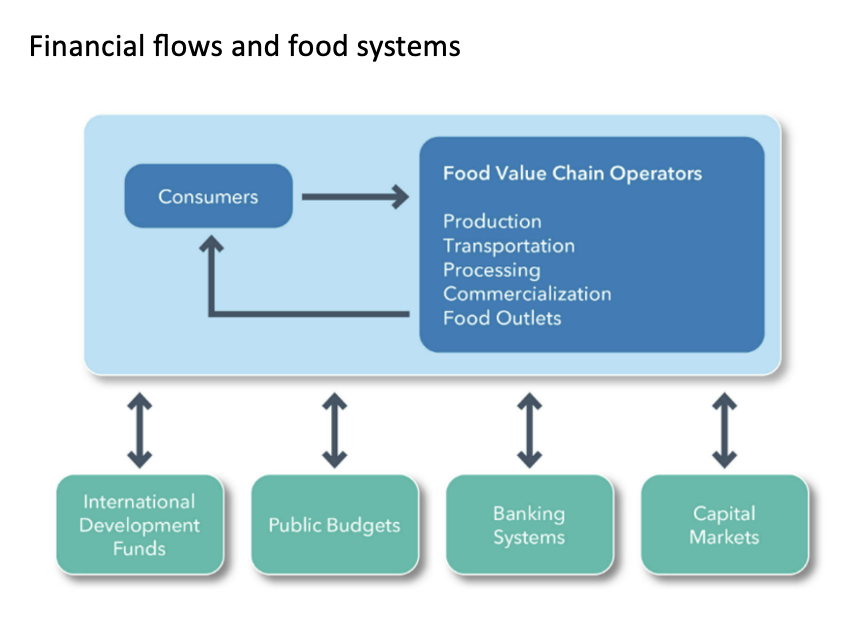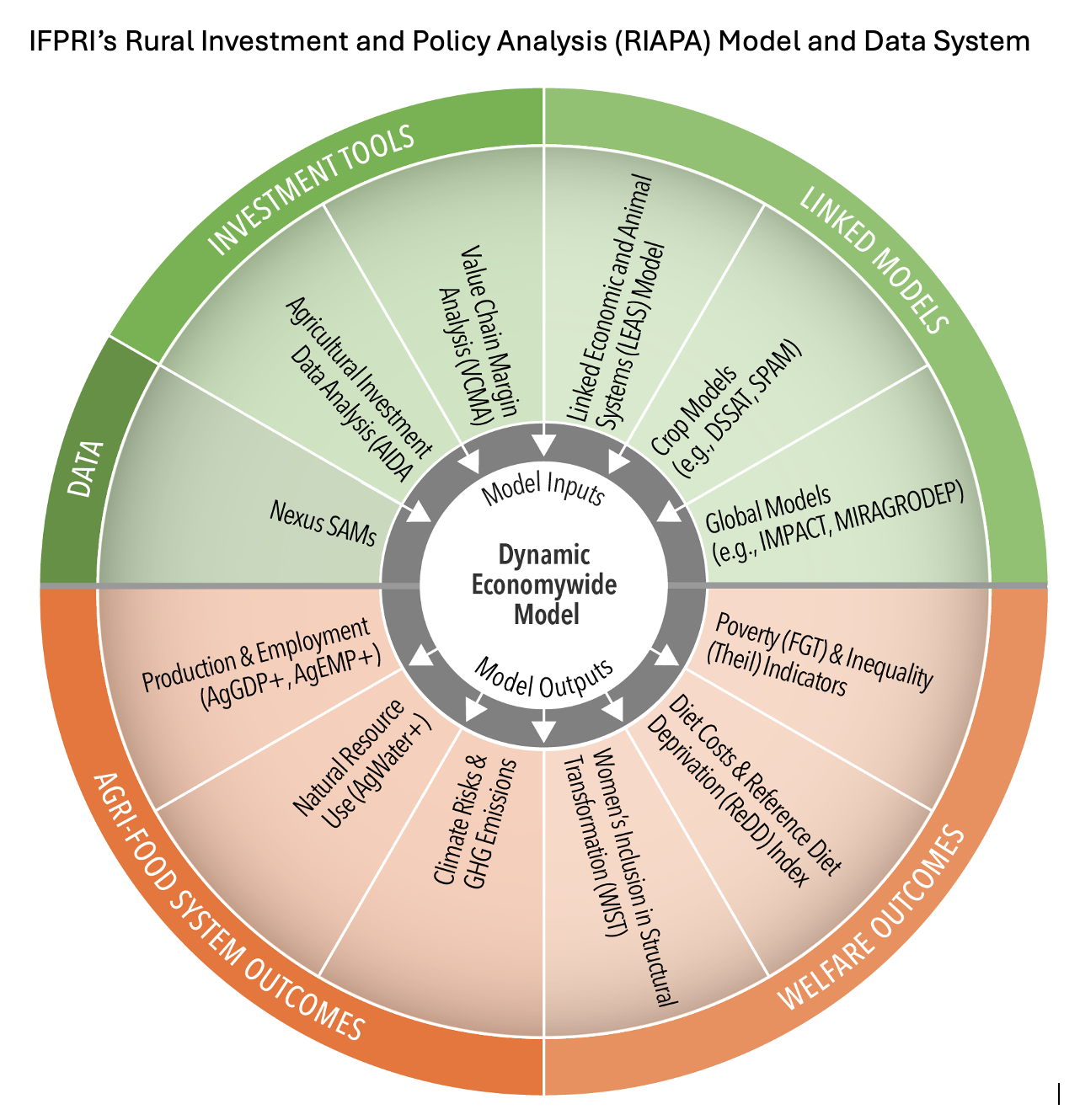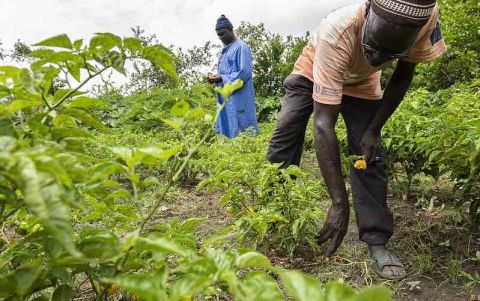Sustainable agriculture, resilient food systems, and climate action: A post-COP28 look at policy imperatives at international and country levels
IFPRI participated in COP28 in late 2023 as part of a wider CGIAR delegation. Following on CGIAR’s five key takeaways from the global climate conference, this blog post—written by IFPRI Communications and Public Affairs Director Charlotte Hebebrand with input from IFPRI research units—reflects on the significance of the COP28 UAE Declaration on Sustainable Agriculture, Resilient Food Systems, and Climate Action through a policy lens.
Despite the inconclusive outcome on the COP27 Sharm El-Sheikh Implementation Plan in Dubai, COP28 has nonetheless been hailed for putting a much needed and strong focus on food systems, which are simultaneously threatened by and contribute to climate change. A key food systems breakthrough reached in Dubai was the COP28 UAE Declaration on Sustainable Agriculture, Resilient Food Systems, and Climate Action, which stresses that “any path to fully achieving the long-term goals of the Paris Agreement must include agriculture and food systems.” We reflect here on important policy decisions required to tackle the key challenges and goals set forth in the Declaration.
Climate finance
As COPs are international gatherings, let’s begin at the international level with the topic of climate finance. Although non-binding, the Declaration reiterates calls for scaled-up and enhanced access to all forms of finance to support the transformation of food systems. With only 4% of all climate finance targeting food systems, it will indeed be crucial to make concrete progress across the multiple funding flows identified in Figure 1, including those internal to food systems (such as consumer and producer expenditures) and those originating from external sources (such as international development funds, public budgets, banking systems, and capital markets). Those flows need to be identified, assessed, reoriented, and scaled to achieve the desired objectives, consistent with Article 2.1(c) of the Paris Agreement, which calls for making “finance flows consistent with a pathway towards low greenhouse gas emissions and climate-resilient development.”
Figure 1
 Source: Díaz-Bonilla, Swinnen and Vos, 2021
Source: Díaz-Bonilla, Swinnen and Vos, 2021
The discussions on “climate finance” have certainly helped to shine a light on the substantial investments needed to transform food systems. But much of that discussion has tilted toward identifying new and additional sources of funding, while the reality is that we also need to identify (1) how to better deploy existing financial resources into the food sector, and (2) how to change market incentives to encourage consumer and producer choices for sustainable and healthy diets. Intelligently changing incentives and choices by food system actors has the additional benefit of crowding-in private sector investments aligned with those choices. The Declaration recognizes this and points to the need to “revisit or reorient policies and public support” to tackle the issues associated with the food–climate nexus.
“Repurposing” agricultural support
IFPRI’s global modeling work, conducted in partnership with multilateral agencies including the World Bank and FAO, demonstrates that the more than $800 billion per year governments provide to support agricultural production and farm incomes often leads to market distortions and unsustainable production methods. Prior to COP28, IFPRI had already shown the enormous potential for win-win-win solutions for people, planet, and prosperity through its scenario analysis of the “repurposing” of the existing support toward more R&D for productivity-enhancing and emission-reducing technologies and practices, greater investment in extension services and for improved rural infrastructure, as well as incentives for farmers and other food sector actors to adopt the improved practices. Repurposing is highlighted as a climate finance priority in the CGIAR 2023 Breakthrough Agenda Report. IFPRI’s analysis further shows that the biggest gains are obtained through internationally concerted action, but the required policy framework will differ from country to country. IFPRI, working closely with partners, is now also engaged in country-specific examinations of how to realign overall support to farm and food sectors with the Nationally Determined Contributions (NDCs) and National Adaptation Plans (NAPs), which countries are designing in follow-up to the Paris Declaration.
WTO Considerations
The Declaration further calls for commitment to strengthen the rules-based, non-discriminatory, inclusive, and equitable multilateral trading system. While agricultural negotiations under the WTO have made little progress, signatories of the Declaration could bring new momentum to the WTO’s 13th Ministerial Conference in February 2024, also to be held in the UAE. As indicated, the “repurposing” analysis points to the need for more public spending on R&D for climate-resilient crop varieties and practices that also reduce GHG emission intensity, an effort best encouraged and guided by clarifying or reforming WTO rules on domestic support.
Ideally, externalities caused by GHG emissions would be fully incorporated in market prices, but this is not likely to be the case any time soon. For now, many countries are considering addressing climate change by establishing emission controls, including border measures, but as IFPRI research shows, these may run afoul of existing trade provisions. Product standards and labeling can be an important tool but, without international coordination, may lead to a confusing array of diverging standards and risk legal challenges at the WTO. Developing a consensus on the most important sustainability standards for food and agricultural products would not only lower trade tensions, but also ensure a concerted and greater positive impact on the environment.
Domestic policies and institutions
While international financing and adherence to mutually agreed multilateral rules-based systems are key facilitators of the necessary transformations, the bulk of the resources for food systems transformation, both public and private, will be domestically generated. In addition, the institutional frameworks and policies that will guide both domestic and international resource allocations and on-the-ground decision-making will be determined principally at the country level. As such, the Declaration urges countries to revisit or reorient policies, institutions, and public support to improve livelihoods, nutrition, and resilience, with particular emphasis on the poor and vulnerable, while transforming food systems to become nature positive.
R&D and innovation
The Declaration singles out the need for greater investments in science and evidence-based innovations to support food systems transformation to address climate change. This includes investments in agricultural R&D. As an example, rather than improving, Africa’s agricultural research intensity ratio—that is, its agricultural research spending as a percentage of agricultural GDP—dropped markedly, from 0.54% in 2000 to just 0.39% in 2016. In 2016, 37 of the 44 African countries for which data were available invested less than 1% of their agriculture GDP in research. Increasing the financial, scientific, and human resources allocated to food systems innovation will be critical to addressing climate change, especially in low- and middle-income countries. IFPRI’s work on innovation policy and scaling demonstrates that progressive policies, investments, and regulations can enable innovation processes ranging from advances in the bioeconomy to the scaling of climate-resilient solutions based on traditional and indigenous knowledge.
Food security, nutrition, and vulnerable populations
To accomplish an equitable transition, all efforts to address climate change must, as the Declaration clearly states, promote the food security and nutrition of vulnerable people—this is also the premise of the agriculture chapter of the Breakthrough Report, as well as of the FAO’s global roadmap, announced at COP28, for achieving SDG2 without breaching the 1.5° C threshold set forth in the Paris Agreement. IFPRI’s examination of progress toward SDG2 on Zero Hunger indicates that, at this near-midway point to 2030, the global targets are far from being met, and that follow-through on the means of implementation drafted as part of the SDG2 targets has been insufficient.
IFPRI and other research reveals that social protection can be a powerful tool for improving resilience among the most vulnerable and advancing social objectives in a context of climate change. A recent IFPRI review of the evidence found that large-scale social protection programs protect women’s and girls’ well-being against adverse impacts of climate change. Social protection programs can help households improve their coping responses, thus reducing the need for maladaptive actions that tend to disproportionately harm women and girls; they can also promote adaptation to climate change, particularly in supporting investment in productive assets and diversifying livelihoods for women and their households. Moreover, bundling resource transfers with other interventions (such as trainings, inputs, investment grants, or linkages to services) may be promising for more transformative adaptation—including promoting women’s and girls’ adoption of climate-smart practices and technologies; creating community assets and infrastructure that are effective in reducing vulnerability to climate hazards; supporting just transitions to greener economies; and importantly, ensuring that women’s and girls’ preferences are incorporated in each of these dimensions. In one example from IFPRI research, an “ultra-poor graduation program” built into Ethiopia’s national social protection program was effective in protecting households’ and women’s well-being following localized droughts, including by improving food security and livestock holdings and reducing intimate partner violence. The program helped participants build up assets and savings, which led to reduced maladaptive behaviors during periods of drought. The graduation program included “light touch” interventions, thus its effectiveness in protecting against adverse impacts of drought is promising for scaling.
While social protection can create a welfare floor and provide timely support to the most vulnerable, it is important to highlight that the vulnerable population is large. The FAO estimates that about 40% of the world’s population cannot afford the cost of a healthy diet. Poor diets have been identified as the primary cause of malnutrition and are a primary cause of diseases worldwide. IFPRI research examines how best to advance towards both more nutritious and sustainable diets by focusing on food environments and ways to influence consumer behavior, to increasing the supply of sustainable and nutritious foods at affordable prices, supporting biofortification of staple crops, and minimizing food loss and waste.
The importance of integrated national plans
International climate change negotiations will and must continue, but they can only be implemented with operational national plans focused on adaptation measures (yet to date only 52 countries have submitted National Adaptation Plans and an inadequate number of implemented adaptation projects) and mitigation projects. The Global Stocktake indicates that global GHG emissions need to be reduced by 43% by 2030 (down from 2019 levels) to remain within the 1.5° C limit of global temperature increase. The UAE Declaration calls for integrating agriculture and food systems programs and plans with Nationally Determined Contributions (NDCs) and National Adaptation Plans, as well as other national plans that can benefit from greater attention to food systems.
It is important to support countries with their NAPs and NDCs, but also to look for synergies across the often numerous plans that governments—especially in low- and middle-income countries—are expected to prepare, in line with their national objectives and considering international agreements. Particularly in the case of low-income countries, multilateral development banks and donors must examine how to lighten and streamline this load.
Alignment with international and multilateral commitments is complicated by the fact that national governments must also weigh multiple food systems goals beyond climate action—food security, economic livelihoods, water security, soil health, and other environmental goals, to name just a few. IFPRI’s suite of forward-looking modeling and foresight tools, which integrate food, land and water systems with economic systems, are being used by our partner country governments to help estimate the impacts of climate change and other challenges on multiple dimensions of food systems, analyze alternative policy and investment options to address those challenges, understand the trade-offs these options imply between different goals for different stakeholders, and inform dialogue among stakeholders to support evidence-based decision-making.
Figure 2
 Source: IFPRI RIAPA model
Source: IFPRI RIAPA model
Political economy and institutional considerations
Determining which goals to prioritize and how to do so is complicated by political economy dynamics and public sector governance challenges. Very few governments in the Global South or North have established a “food systems ministry.” Instead, food and agricultural topics are handled by multiple ministries, often without sufficient coordination. Moreover, entrenched and diverging interest groups—both internal and external to government ministries and agencies—can create obstacles to achieving the design and implementation of operational plans at the national level. A recently published IFPRI and Oxford University book examines how to ground food system transformation pathways in a sound understanding of interest groups dynamics, incentive systems, the role of ideology, and coalitions and accountability structures in a climate of rising geopolitical conflict, populism and nationalism, and wide gaps between empirical findings and disinformation campaigns.
The signatories to the UAE Declaration indicate that “… we intend to strengthen collaboration among our respective ministries—including agriculture, climate, energy, environment, finance, and health—and with diverse stakeholders to achieve the objectives and efforts articulated in this Declaration…” Through the longstanding policy work undertaken jointly with partners in IFPRI’s country offices, IFPRI has seen firsthand the benefits flowing from institutional arrangements and operational plans that are built with cross-government and multistakeholder inputs.
Final observations
In conclusion, while non-binding, the UAE Declaration, now signed by more than 160 countries, prominently highlights the imperative to urgently move toward food systems transformation and keep this agenda front and center at UNFCCC COPs and all other relevant forums. Transformation needs to be supported by adequate funding and clear trade rules at the international level but will also require forceful and concrete decision-making at the national level. IFPRI, as CGIAR’s sole policy-focused research center, provides analytical support to decision-makers in identifying effective and feasible technological and policy solutions and their costs and benefits, as well as possible trade-offs across multiple objectives. IFPRI will work with CGIAR colleagues and partners around the world to provide the evidence-based policy solutions needed to advance the objectives set forth in the Declaration.

Men gather peppers in a community garden in Njoben, the Gambia, part of a farmer field school that offers training in climate-smart agriculture.
LINKS
CGIAR Five Key Takeaways From COP28
COP28 UAE Declaration On Sustainable Agriculture, Resilient Food Systems, And C…
TOPICS
COUNTRIES
